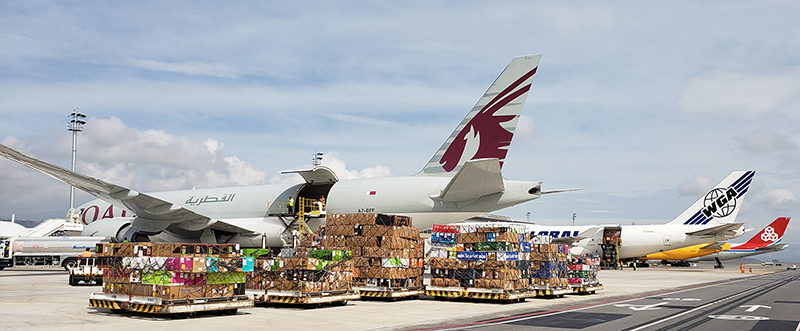CARGO OPERATIONS AT THE AIRPORT CONTINUED DURING THE PROTESTS

Cargo exports continued from Mariscal Sucre Airport despite the difficult situation faced in the country, and particularly the flower industry, during the protests and indigenous mobilization which ended recently. The cargo agencies at Tabacarcen and the palletizers at the airport’s export terminal continued to operate and flights which landed at the airport were dispatched.
In total, 23 cargo flights were affected from October 7 – 13, out of a total of 60 flights that were scheduled during this period. Fifteen flights were cancelled, three were rescheduled for a later date and five were delayed.
There was a 40% drop in the volume of flowers processed for export during the protests. Shipments of flowers were transported to the cargo agencies and the cargo terminal in convoys, avoiding road closures.
The four palletizer companies (Pertraly, Servipalet, Novacargo and Aronem) continued to operate by making changes to work shifts wherever possible and supporting their staff when it was necessary to extend shifts to guarantee the continuity of flower exports.
Eduardo Emanuele, General Manager of Pertraly, explains “we received cargo with a certain irregularity and processed and shipped it using the aircraft that were operating during this time. Given the delicate situation, we had to intensify security and controls for the cargo”.
“Stopping operations was never an option and we continue to work to the highest standards of quality and safety, as expected. We were always prepared to handle the cargo which continued to arrive from the flower sector to the cargo agencies and on to our facilities. From this perspective, cargo operations at Quito Airport were not interrupted” he concludes.
Santiago Gómez de la Torre, General Manager of Tabacarcen where 70% of the cargo agencies that handle flowers operate, confirms that “during the strike that lasted from October 9 – 13, Tabacarcen operated 24 hours a day. Regarding operations, we have a contingency plan in place, so we never have to stop offering our services to the clients and users in Quito and the province, particularly importers, flower growers and cargo agencies.
He continues, “we are pleased to have been able to persevere in a time of crisis and this is all thanks to our ongoing training and commitment in these matters. We constantly communicated and coordinated with security and law enforcement agencies, who supported and protected us, to provide reassurance to the community despite the circumstances in the country. Although this was a difficult time for the whole country, cargo continued to arrive, and we never stopped receiving it with our and our clients’ operations. Our employees showed great commitment to the country and, together with well-provisioned emergency logistics including beds, food and games as a distraction, we were able to offer an unrestricted service”.
